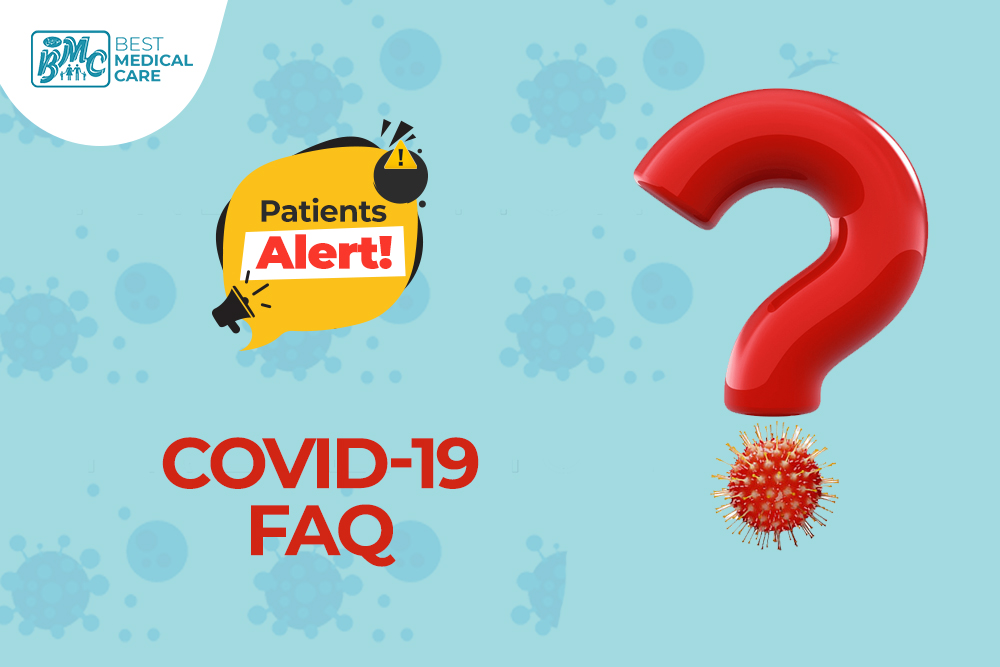COVID-19 FAQS

What is the coronavirus and COVID-19?
Coronaviruses were first identified in the 1950s and generally cause mild upper respiratory illness characterized by cough, fever, and/or body aches. This is very similar to most viral illnesses including flu and the common cold.
The current situation involves a new, or “novel,” coronavirus and the illness it causes is called COVID-19 (coronavirus disease 2019). Because this virus is new, testing has been limited; there are no vaccines and no medicines designed specifically to treat it.
Am I at risk for coronavirus?
The complete clinical picture with regard to COVID-19 is not fully known. As the pandemic expands, the risk of exposure will increase, and all persons are at risk for getting infected. Older adults and people who have serious chronic medical conditions like heart disease, lung disease and diabetes, seem to be at higher risk of more serious illness due to COVID-19.
Can I come in and be tested for coronavirus?
Best Medical Care is currently offering two forms of COVID-19 testing at all locations – the PCR (Nasal Swab) test and the Serum Antibody IgG (Blood Test).
The PCR (Nasal Swab) test will detect if you are actively infected with the COVID-19 virus.
The Serum Antibody IgG (Blood Test) will detect if you have had prior exposure to COVID-19 and have built an antibody for the virus. For most viral illnesses, a positive antibody means prior exposure to a virus and some degree of Immunity to future infection. As COVID-19 is a novel (new) infection, it is unclear if a positive antibody definitively offers immunity. Most experts agree it likely does, however the recommendation is to still practice universal precautions.
To learn more about Best Medical Care COVID-19 testing, please click here.
What can we do to reduce the spread of the disease?
Everyone should be maximizing “social distancing” to slow down the spread of COVID-19, as the disease is now in the community and can be spread by people who may not have symptoms. Here are things you can do to protect yourself, your loved ones, and the community:
– Stay home unless it is necessary to go to work, purchase necessary items, help someone who needs support, or seek medical care.
– Do not visit friends, gather in groups or otherwise socialize in person. Use virtual technologies to stay connected.
– Wear cloth face coverings in public settings where other social distancing measures are difficult to maintain (e.g., grocery stores and pharmacies).
What are the symptoms caused by coronavirus?
People with COVID-19 have had a wide range of symptoms reported – ranging from mild symptoms to severe illness. Symptoms may appear 2-14 days after exposure to the virus.
People with these symptoms or combinations of symptoms may have COVID-19:
– Cough
– Shortness of breath or difficulty breathing
Or at least two of these symptoms:
– Fever
– Chills
– Repeated shaking with chills
– Muscle pain
– Headache
– Sore throat
– New loss of taste or smell
This list is not all inclusive. Please consult your medical provider for any other symptoms that are severe or concerning to you.
Because it is still cold and flu season, and allergy season is starting, our urgent cares continue to see a significant number of patients with these symptoms. As with the flu, most people who get coronavirus experience fever, cough, muscle pain or weakness, and fatigue, and will have a complete recovery.
Can the coronavirus be treated?
Since it is a virus, the coronavirus cannot be treated with antibiotics. Mild infections are treated in the same way as the common cold or flu with medications to relieve the symptoms of cough, congestion, and fever.
What should I do if I am experiencing symptoms?
If you are in respiratory distress, please call 911. If you have a fever, cough, and other symptoms of a respiratory infection, please visit your closest Best Medical Care location. As a precaution, wear a mask if possible and limit exposure to others. Please immediately notify the staff of your possible illness upon arrival.
Is it safe to take ibuprofen?
There is currently no scientific evidence suggesting that use of ibuprofen can worsen COVID-19. This concern is hypothetical. The World Health Organization (WHO) has made no recommendation against the use of ibuprofen. If you are taking prescription ibuprofen, it is safe to continue taking it for your condition as prescribed by your provider. It is also safe to take either over-the-counter ibuprofen or acetaminophen at recommended doses for short-term use to relieve pain and reduce fever. Discuss with your providers about long-term use of either medication.
What should I do to avoid infection?
Please stay aware and take proper precautions. The coronavirus spreads via respiratory droplets such as from a cough or sneeze, so you should be using the same prevention methods as you would to avoid a cold or the flu:
– Wear cloth face coverings in public settings where other social distancing measures are difficult to maintain (e.g., grocery stores and pharmacies).
– Wash your hands often with soap and water for at least 20 seconds, especially after going to the bathroom, before eating, and after blowing your nose, coughing or sneezing.
– If soap and water are unavailable, use an alcohol-based hand sanitizer with at least 60% alcohol. Always wash hands with soap and water if hands are visibly dirty.
– Avoid close contact with people who are sick.
– Avoid touching your eyes, nose and mouth.
– Stay home.
– Clean and disinfect frequently touched objects and surfaces using a regular household cleaning spray or wipe.
Are there any changes to your hours or open locations?
In order to preserve our ability to staff our sites with the dedicated doctors and teams you rely on from Best Medical Care, we are proactively closing certain locations temporarily to allow us to adjust staffing at other Best Medical Care locations to continue to provide the care you and your families need.
What is Best Medical Care doing to keep all patients safe?
We take this situation very seriously and have been preparing for potential cases for weeks. For us that means reinforcing our protocols, using appropriate supplies and devising rapid-response contingency plans. At Best Medical Care locations, all staff are trained on the appropriate care for patients with flu-like symptoms and are wearing masks and using protective equipment when appropriate. We are following CDC and DOH guidelines to limit the spread of the virus including how we isolate patients with symptoms and how we disinfect rooms between patients.
Where can I get more information?
NJ Department of Health:
24-hour public hotline: 1-800-222-1222
Website: https://www.nj.gov/health/cd/topics/covid2019_resources.shtml
NJ COVID-19 Information Hub:
A COVID-19 website is available at covid19.nj.gov
NY Department of Health:
Coronavirus Hotline: 1-888-364-3065
Website: https://www.health.ny.gov/diseases/communicable/coronavirus/
Centers for Disease Control and Prevention:
Website: https://www.cdc.gov/coronavirus/2019-ncov/index.html

